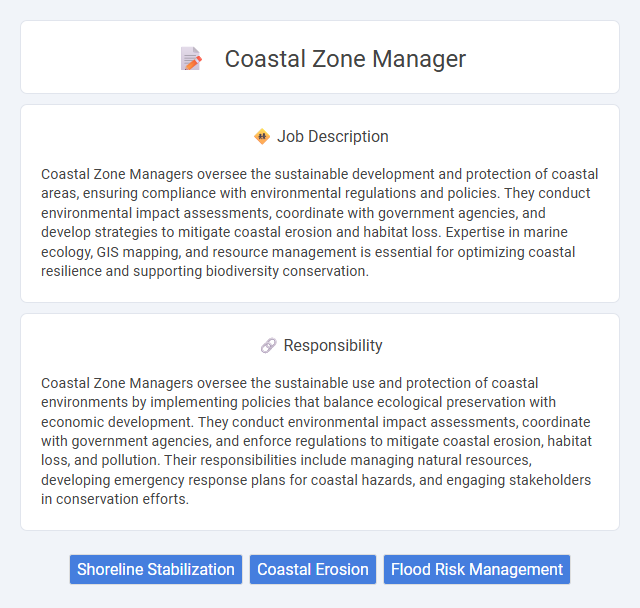
Coastal Zone Managers oversee the sustainable development and protection of coastal areas, ensuring compliance with environmental regulations and policies. They conduct environmental impact assessments, coordinate with government agencies, and develop strategies to mitigate coastal erosion and habitat loss. Expertise in marine ecology, GIS mapping, and resource management is essential for optimizing coastal resilience and supporting biodiversity conservation.
Individuals with strong analytical skills and a passion for environmental conservation are likely suitable for a Coastal Zone Manager role. Those comfortable working in dynamic outdoor settings and handling complex regulatory frameworks may find this job aligns well with their strengths. People who prefer routine tasks or limited interaction with diverse stakeholders might face challenges in adapting to the multifaceted responsibilities of this position.
Qualification
A Coastal Zone Manager typically requires a bachelor's degree in environmental science, marine biology, or natural resource management, with many positions preferring a master's degree for advanced expertise. Strong knowledge of coastal ecology, environmental regulations such as the Coastal Zone Management Act (CZMA), and GIS mapping skills is essential. Experience in project management, stakeholder engagement, and policy development enhances qualification, ensuring effective coastal resource protection and sustainable development.
Responsibility
Coastal Zone Managers oversee the sustainable use and protection of coastal environments by implementing policies that balance ecological preservation with economic development. They conduct environmental impact assessments, coordinate with government agencies, and enforce regulations to mitigate coastal erosion, habitat loss, and pollution. Their responsibilities include managing natural resources, developing emergency response plans for coastal hazards, and engaging stakeholders in conservation efforts.
Benefit
A Coastal Zone Manager likely benefits from opportunities to protect and preserve vital marine ecosystems, supporting biodiversity and natural resources. This role probably offers career growth through collaboration with environmental agencies and exposure to regulatory policy development. Success in managing sustainable coastal development can lead to long-term ecological and economic advantages for communities.
Challenge
The Coastal Zone Manager likely faces the challenge of balancing environmental protection with economic development demands in rapidly changing coastal areas. Navigating complex regulations and coordinating with multiple stakeholders may pose significant difficulties. Adapting to climate change impacts, such as rising sea levels and increased storm frequency, also presents ongoing challenges in resource management.
Career Advancement
Coastal Zone Managers oversee the sustainable development and protection of coastal areas, integrating environmental science, policy, and stakeholder collaboration to address erosion, habitat preservation, and climate change impacts. Career advancement opportunities include progressing to senior environmental consultant roles, policy advisor positions, or leadership roles within government agencies and international organizations focused on marine and coastal resource management. Mastery of GIS technology, environmental law, and project management significantly enhances prospects for leadership and specialized consultant positions in this field.
Key Terms
Shoreline Stabilization
Coastal Zone Managers specializing in Shoreline Stabilization implement erosion control techniques such as seawalls, groins, and beach nourishment to protect coastal habitats and infrastructure. They analyze tidal patterns, sediment transport, and wave dynamics to design sustainable interventions that mitigate shoreline retreat and enhance storm resilience. Collaboration with environmental scientists and urban planners ensures compliance with regulatory frameworks like the Coastal Zone Management Act, promoting balanced coastal development.
Coastal Erosion
Coastal Zone Managers specialize in mitigating coastal erosion by developing and implementing sustainable shoreline protection strategies that preserve ecosystems and property. They analyze erosion patterns using geospatial data and remote sensing technologies to inform policy decisions and enforce regulations. Effective management includes coordinating interdisciplinary teams to balance environmental conservation with community resilience against rising sea levels and storm impacts.
Flood Risk Management
Coastal Zone Managers specializing in flood risk management develop and implement strategies to protect vulnerable shorelines from rising sea levels and storm surges. They analyze hydrological data, assess flood hazards, and coordinate with government agencies to design resilient infrastructure and emergency response plans. Effective management helps mitigate economic losses and safeguard communities against coastal flooding threats.
 kuljobs.com
kuljobs.com